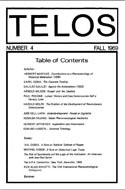As an occasional feature on TELOSscope, we highlight a past Telos article whose critical insights continue to illuminate our thinking and challenge our assumptions. Today, Juan Carlos Donado looks at Paul Piccone’s “Science, Art and Revolution: An Introduction to Galileo as a Poet,” from Telos 4 (Fall 1969).
 Even if Paul Piccone in fact mistakenly attributes the poem Contro Gli Aristotelici to Galileo—as scholars such as Charles B. Schmitt claim—the conclusion remains invariably the same. Piccone, of course, is not alone in this: the mistake originated in an early article written by the great Galilean scholar Antonio Favaro (1869–1922), responsible for the colossal twenty-volume edition of Galileo’s Opere. Favaro himself corrected the mistake one year later in a much lesser known article, but in print the attribution was already made and Jacopo Soldani’s satire, for years, was adopted by Galileo’s pen.
Even if Paul Piccone in fact mistakenly attributes the poem Contro Gli Aristotelici to Galileo—as scholars such as Charles B. Schmitt claim—the conclusion remains invariably the same. Piccone, of course, is not alone in this: the mistake originated in an early article written by the great Galilean scholar Antonio Favaro (1869–1922), responsible for the colossal twenty-volume edition of Galileo’s Opere. Favaro himself corrected the mistake one year later in a much lesser known article, but in print the attribution was already made and Jacopo Soldani’s satire, for years, was adopted by Galileo’s pen.
Philosophy, nevertheless, has a way of profiting from errors. Having used the misattribution as an open window for cultural criticism, Piccone’s reflections have lost none of their sting. Moreover, in a world radically speeding toward frivolous specialization, the very thought of a hard scientist writing poetry puts a frown on our face today, most likely, more than it did on Piccone’s. The laboratory, so to speak, dissociates itself at quantum leaps from the ideal of the man of letters. As Piccone is keen to remind us: “The results of this state of affairs are all too obvious: civil society turns into an infernal labyrinth run by highly sophisticated idiots whose main function turns out to be the overseeing of the inevitable unfolding of the ‘natural’ logic of the establishment—a Frankenstein that systematically moronizes its original creators and eventually precipitates the whole world into self-annihilation.”
It is difficult to depict the one-dimensionality of society better than by picking into the seams that suture, or should suture, art and science. Piccone crucially emphasizes the creative scientific moment that, given its capacity to shape and inform reality, should by all means approximate it to art. In Piccone’s own words, both the chisel and the paintbrush, as well as a set of motley equations, are productive tools inscribed within a teleological frame of reference that, by actively apprehending a reality that is eventually transformed, give meaning to our world of experience. Piccone has no problem pairing Lukács’s dialectics with Husserl’s phenomenology, explaining that, for both thinkers, art and science must perform a similar task: they must capture the essence couched within phenomena; they must apprehend the regularities that lie at the core of our experience of the world.
But Piccone does not stop here. His interpretation of the rise of Galilean science is certainly provocative. Arguing for the incommensurability between the Aristotelian and Galilean models, given that a choice between the two requires extra-scientific grounds for each theory has nothing in common with the other beside the Lebenswelt out of which each arose, Piccone’s materialism takes no prisoners. His claim is straightforward:
A cursory examination of the historical record indicates that Galilean science won out not because, on strictly scientific grounds, scientists suddenly realized that it was superior to the Aristotelian—something that was logically impossible given the structure of the two theories—but because it had practical applications that could be readily exploited by the rising bourgeoisie in the class-struggle with the feudal nobility. In fact, as Galileo himself reports, the invention of the telescope, because of its military potential in naval warfare, led to an immediate doubling of his salary which was already three times that of his less inventive predecessors.
As Piccone’s arguments follow one another, we are left pondering a rather subtle question: if such misattribution opens the way to thought and thought lies at the core of philosophy, then something must be said about the way philosophy has of profiting from errors.
Read the full version of Paul Piccone’s “Science, Art and Revolution: An Introduction to Galileo as a Poet” at the Telos Online website. If you are affiliated with an institution that is an online subscriber to Telos, you have free access to our complete online archive. If not, you can purchase 24-hour access to this and other Telos articles at a per-article rate. Follow the article link for more details.



